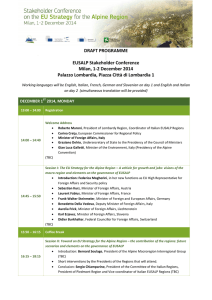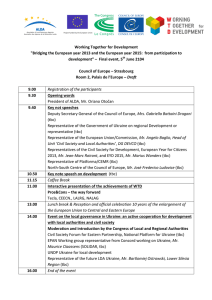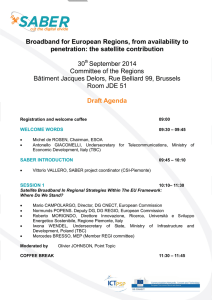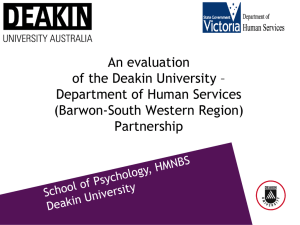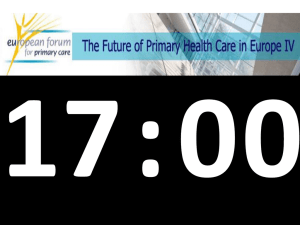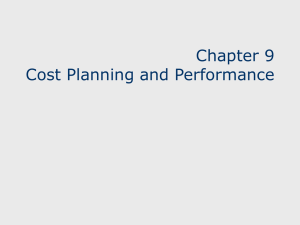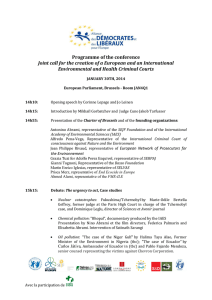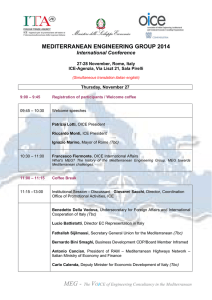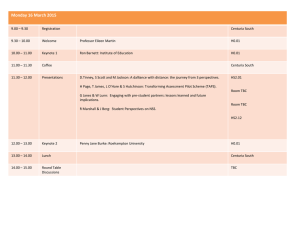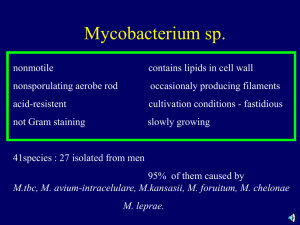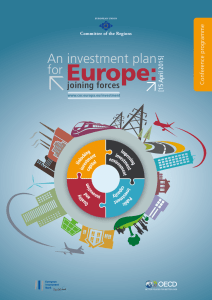draft programme december 1st 2014, monday
advertisement
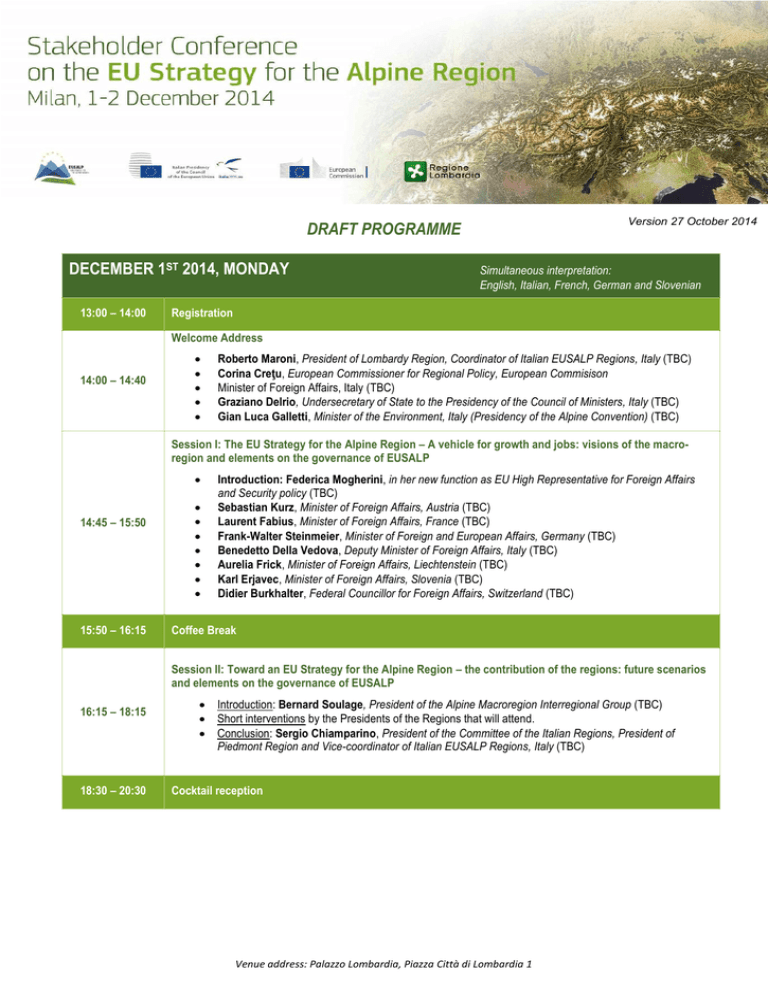
Version 27 October 2014 DRAFT PROGRAMME DECEMBER 1ST 2014, MONDAY 13:00 – 14:00 Simultaneous interpretation: English, Italian, French, German and Slovenian Registration Welcome Address 14:00 – 14:40 Roberto Maroni, President of Lombardy Region, Coordinator of Italian EUSALP Regions, Italy (TBC) Corina Creţu, European Commissioner for Regional Policy, European Commisison Minister of Foreign Affairs, Italy (TBC) Graziano Delrio, Undersecretary of State to the Presidency of the Council of Ministers, Italy (TBC) Gian Luca Galletti, Minister of the Environment, Italy (Presidency of the Alpine Convention) (TBC) Session I: The EU Strategy for the Alpine Region – A vehicle for growth and jobs: visions of the macroregion and elements on the governance of EUSALP 14:45 – 15:50 15:50 – 16:15 Introduction: Federica Mogherini, in her new function as EU High Representative for Foreign Affairs and Security policy (TBC) Sebastian Kurz, Minister of Foreign Affairs, Austria (TBC) Laurent Fabius, Minister of Foreign Affairs, France (TBC) Frank-Walter Steinmeier, Minister of Foreign and European Affairs, Germany (TBC) Benedetto Della Vedova, Deputy Minister of Foreign Affairs, Italy (TBC) Aurelia Frick, Minister of Foreign Affairs, Liechtenstein (TBC) Karl Erjavec, Minister of Foreign Affairs, Slovenia (TBC) Didier Burkhalter, Federal Councillor for Foreign Affairs, Switzerland (TBC) Coffee Break Session II: Toward an EU Strategy for the Alpine Region – the contribution of the regions: future scenarios and elements on the governance of EUSALP 16:15 – 18:15 18:30 – 20:30 Introduction: Bernard Soulage, President of the Alpine Macroregion Interregional Group (TBC) Short interventions by the Presidents of the Regions that will attend. Conclusion: Sergio Chiamparino, President of the Committee of the Italian Regions, President of Piedmont Region and Vice-coordinator of Italian EUSALP Regions, Italy (TBC) Cocktail reception Venue address: Palazzo Lombardia, Piazza Città di Lombardia 1 DECEMBER 2ND 2014, TUESDAY 09:00 - 11:45 Simultaneous interpretation: English and Italian Parallel Thematic Sessions Session 3: Protecting the environment and promoting a sustainable management of energy and natural and cultural resources A key feature of the Alpine region is its unique natural and cultural heritage. However, one of the key challenges is to further develop an environmentally friendly way to make use of natural resources and exploit their potential. On the other hand, climate change could particularly affect the Alpine region in terms of availability of resources and threats to population and thus joint regional responses are necessary to establish efficient management systems. A further priority that needs to be tackled in the framework of EUSALP concerns the enhancement of the Alpine region’s position in terms of energy efficiency and sustainable production of renewable energy. Session 1: Driving innovative growth Session 2: Connecting the region Home to 70 million people, with a GDP of more than 2000 billion Euros, the Alpine region can be truly defined as the “Heart of Europe”, the largest European economic and productive hub with a very high development potential. However, lack of economic, social and territorial cohesion, in particular between the core mountain areas and the surrounding territories, is still an issue. In order to contribute to bridge these gaps and to maintain the high quality of life that is common to the region, EUSALP aims to support innovative and sustainable economic development in the Alpine Region. In particular, priority areas of intervention include the development of innovation and research capacity, the improvement of the support for enterprises and the promotion of high levels of employment. The Alpine Region, lying at the heart of the continent, represents a major European crossroads. However, the development of sustainable transport systems as well as the enhancement of the accessibility to communication infrastructures and services (including tourism) are major challenges. EUSALP aims at developing a coordinated policy that is able to match the transport needs of the region, the welfare and quality of life of the population and the equilibrium of a particularly fragile environment. Moreover, improving the accessibility to Information and Communication Technologies (ICTs) could further bridge remaining gaps in the region, as well as contribute to a more sustainable model of development. Chair: Rossella Rusca, Head of Unit, Representation of Italy at EU, Italy (TBC) Chair: Marc-Etienne Pinauldt, Director, Directorate-General for the Development of Territories, France Chair: Peter Eggensberger, Ministry of Environment and Consumer Protection, Bavaria State, Germany Facilitator: Jean-Marc Venineaux, DirectorateGeneral for Regional and Urban Policy, European Commission Facilitator: Marco Onida, Directorate-General for Regional and Urban Policy, European Commission Facilitator: Frithjof Ehm, Directorate-General for Regional and Urban Policy, European Commission Speakers: to be jointly identified by participating States Speakers: to be jointly identified by participating States Speakers: to be jointly identified by participating States Venue address: Palazzo Lombardia, Piazza Città di Lombardia 1 11:45 – 12:00 Coffee Break Closing Session – The way forward The EU Strategy for the Alpine Region: State of Play and Future Prospects. Presentation by the European Commission 12:10 – 13:10 Lena Andersson Pench, Director, Directorate-General for Regional and Urban Policy, European Commission Colin Wolfe, Head of Competence Centre Macro-regions and European Territorial Cooperation, European Commission Q&A Session Conclusions 13:10 – 13:20 13:20 Normunds Popens, Deputy Director-General, Directorate-General for Regional and Urban Policy, European Commission Ugo Parolo, Lombardy Region Government, Italy (TBC) Networking lunch Venue address: Palazzo Lombardia, Piazza Città di Lombardia 1
